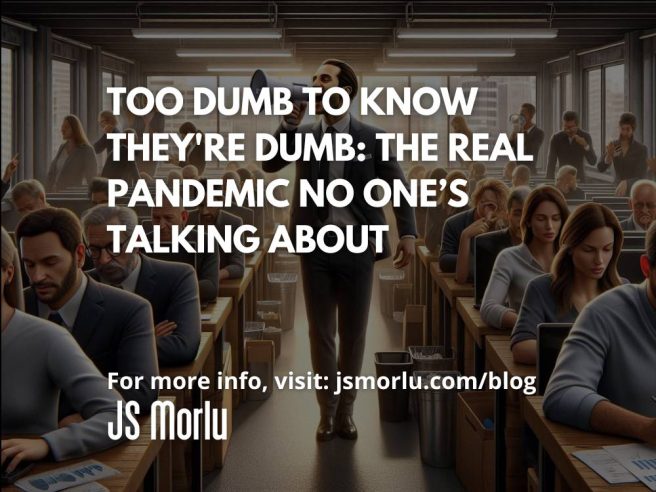A Survival Guide for Smart People in a Loud World
By: John S. Morlu II, CPA
What Is the Dunning-Kruger Effect?
In simple terms:
The dumber you are, the smarter you think you are.
Named after psychologists David Dunning and Justin Kruger, this effect happens when people with low ability in a subject overestimate their skill. They don’t know enough to realize how little they know.
It’s like:
- A cat thinking it’s a lion.
- A karaoke singer auditioning for The Voice and yelling “Robbed!” when they don’t win.
- An intern who just learned Excel and says, “I can run this whole department.”
Meanwhile, truly smart people often doubt themselves, because the more you know, the more you realize how much you don’t know.
Funny how that works, right?
Fun Fact #1:
The Dunning-Kruger Effect was discovered after a man robbed a bank with lemon juice on his face, thinking it would make him invisible to cameras.
Yes, he thought lemon juice = invisibility cloak.
He got caught. Obviously.
The psychologists studying him thought, “We need to research why people this wrong can be so confident.”
Why This Matters in Business, Government, and Non-Profits
If you’re running a business, leading a government department, or trying to save the world through a non-profit—beware:
The Dunning-Kruger Effect now has Wi-Fi.
In a world where a single Google search = “expertise,” and anyone with a webcam is suddenly a “thought leader,” this problem isn’t just annoying — it’s dangerous.
Let’s break it down by sector, with real-world examples you’ve probably survived already.
In Business:
Dunning-Kruger doesn’t just walk into the office — it sets up a ring light and hosts a webinar.
- The vendor who claims to be “the best in the industry” but delivers screenshots from Canva and invoices with Comic Sans.
- The junior employee who watched 2 TED Talks and now wants to “completely rethink your go-to-market strategy.”
- The CEO who replaces accountants with ChatGPT and says, “AI can do taxes now.”
- The startup founder who rejects market research because “Twitter vibes are better than data.”
- The small business owner who proudly says, “We don’t do paperwork,” and then wonders why they can’t get a loan.
Pro Tip:
Just because someone has a slick pitch deck and 10K Instagram followers doesn’t mean they can run a business.
That’s not strategy. That’s filters.
In Government:
Governments aren’t immune. In fact, they often mass-produce Dunning-Kruger with pensions and titles.
- The agency head appointed because he’s someone’s cousin. His only real credential? He once organized a wedding.
- The IT Director who thinks Excel + password = cybersecurity.
- The procurement boss who uses Google Translate to review Chinese contracts — and thinks it’s “fine.”
- The official who cancels a policy because a “motivational reel on Instagram said otherwise.”
- The committee chair who wants to regulate AI but still prints emails.
🤖 And yes — there’s always someone saying,
“Let’s just ask ChatGPT. Why hire experts?”
📛 AI is powerful. But in the wrong hands, it’s like giving a toddler a chainsaw and saying, “Build a swing set.”
In Non-Profits:
Non-profits attract passion — which is great — but passion without context is how you end up building a library… where no one can read.
- The donor who wants to “transform a village” with $100, a T-shirt, and a drone.
- The volunteer who read one blog post on microloans and wants to overhaul your entire funding model.
- The board member who’s never visited the project site but insists, “This just needs more storytelling.”
- The consultant who uses ChatGPT to write a grant and then blames the software when it includes fake UN statistics.
- The social media intern who pitches a campaign based on TikTok trends… for a famine relief fund.
Pro Tip:
It’s not impact if you’re causing more confusion than clarity.
And no — you cannot “pivot to blockchain” just because you saw a guy do it on LinkedIn with hashtags like #FutureOfAid.
Why It’s Worse Now
We live in a world where:
- Google gives answers without understanding.
- YouTube makes everything look DIY-able.
- AI sounds smart — even when it’s confidently wrong.
- Social media rewards noise over nuance.
So people think:
“I watched a documentary. I know what I’m doing.”
“I asked ChatGPT. I don’t need your 15 years of experience.”
“I saw a reel about it. Trust me.”
But here’s the thing:
Watching a Gordon Ramsay video doesn’t make you a chef.
Typing into ChatGPT doesn’t make you a data scientist.
Reading a blog doesn’t make you a policymaker.
Yet here we are.
Surrounded by “experts” who are just very loud, very wrong, and very online.
In this modern world of performative knowledge, Dunning-Kruger isn’t just a psychological effect — it’s a business risk, a policy hazard, and a donor disaster waiting to happen.
Hire slowly. Vet deeply. Train constantly. And above all:
Stay humble, stay skeptical, and double-check anyone who says “Trust me, I got this” — especially if they just read about it this morning.
Common Sense Check
If you:
- Haven’t studied the field…
- Haven’t done the work…
- Can’t explain your logic in one paragraph…
You probably aren’t the expert.
Confidence ≠ Competence.
Opinions ≠ Expertise.
And saying “I feel like” doesn’t make you right.
So Why Do Dumb People Think They’re Smart?
Because they:
1. Don’t know what they don’t know. (Lack of awareness.)
2. Overrate themselves to protect their ego. (Nobody likes to feel dumb.)
3. Think confidence = knowledge. (It doesn’t.)
It’s like giving a toddler the car keys because they seem “really sure” they can drive.
Meanwhile, Smart People Often Feel… Dumb?
Yup. It’s called Impostor Syndrome.
Smart people are aware of:
- How big the problem is.
- How many variables exist.
- How others might be smarter or better.
So they hesitate, ask questions, and seek feedback—while lemon juice man is already applying for CEO.
What Smart Leaders Do Differently:
✅ Hire for skills, not just confidence.
✅ Ask questions, even when you “know” the answer.
✅ Stay humble—because reality is the ultimate scoreboard.
✅ Encourage feedback and diverse viewpoints.
✅ Train your team to know what they don’t know.
Fun Fact #2:
In a study, 80% of drivers thought they were “above average.”
That’s statistically impossible.
Same thing happens in business:
- 80% think they’re visionary.
- 90% think they’re strategic.
- But only 1% are actually useful in a crisis.
The rest?
Making decks no one reads, or renaming folders to “Final_Version_REAL_Final_FINAL_v2_REVISED.”
Final Thought:
The real danger isn’t stupidity.
It’s stupid people who don’t know they’re stupid—and think they’re smarter than the experts.
It’s ignorance with a microphone.
It’s unskilled people with decision-making power.
Want to succeed in business, government, or charity?
Stay curious. Stay humble. Stay learning.
Because the smartest people in the room are often the quietest—the ones listening, not lecturing.
“The only true wisdom is in knowing you know nothing.”
—Socrates (aka: not a lemon juice guy)
Author: John S. Morlu II, CPA is the CEO and Chief Strategist of JS Morlu, leads a globally recognized public accounting and management consultancy firm. Under his visionary leadership, JS Morlu has become a pioneer in developing cutting-edge technologies across B2B, B2C, P2P, and B2G verticals. The firm’s groundbreaking innovations include AI-powered reconciliation software (ReckSoft.com) and advanced cloud accounting solutions (FinovatePro.com), setting new industry standards for efficiency, accuracy, and technological excellence.
JS Morlu LLC is a top-tier accounting firm based in Woodbridge, Virginia, with a team of highly experienced and qualified CPAs and business advisors. We are dedicated to providing comprehensive accounting, tax, and business advisory services to clients throughout the Washington, D.C. Metro Area and the surrounding regions. With over a decade of experience, we have cultivated a deep understanding of our clients’ needs and aspirations. We recognize that our clients seek more than just value-added accounting services; they seek a trusted partner who can guide them towards achieving their business goals and personal financial well-being.
Talk to us || What our clients says about us







